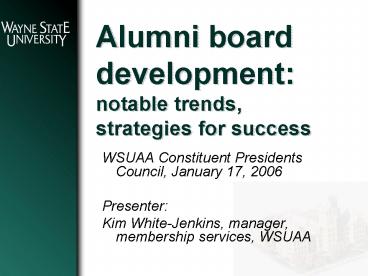Alumni board development: notable trends, strategies for success - PowerPoint PPT Presentation
1 / 30
Title:
Alumni board development: notable trends, strategies for success
Description:
Define terms of service. Anticipate succession plan ... Maintain visibility in communications vehicles (WS mag, school/college pubs, Web) ... – PowerPoint PPT presentation
Number of Views:28
Avg rating:3.0/5.0
Title: Alumni board development: notable trends, strategies for success
1
Alumni board developmentnotable trends,
strategies for success
- WSUAA Constituent Presidents Council, January 17,
2006 - Presenter
- Kim White-Jenkins, manager, membership services,
WSUAA
2
What well cover
- Relevant trends
- Positioning the board
- Importance of strategic planning
- Setting goals
3
Adapted from
- Jennifer A. McDonough Bentz Whaley Flessner
- Web seminarDec. 8, 2005
4
Trends take note!
- Interdependence with development and
communications - Movement away from the social model
5
Trends take note!
- Emergence of volunteer opps in the areas of
admissions, advocacy, career services
6
Trends take note!
- Opportunities for finite yet meaningful volunteer
opportunities
7
Trends take note!
- Increased emphasis on and impact of
e-communications
8
Positioning the board Board recruitment
9
What are your board recruiting objectives?
10
Build your board with this tenet in mind
Ultimately, alumni should be top of mind
within the institutions leadership, goals and
strategies, and your board is an important
conduit.
11
Creating the board
- Audit your current/returning members for
background, skills, interests represented - Develop a relevant profile for new and
prospective members
12
Creating the board
- Know your mission and vision
- Define position descriptions for board as a
whole, individuals and committees
13
Creating the board
- Articulate expectations for time and involvement
- Involve top leadership in member recruitment, or
at least in welcoming new members/confirming
expectations for service
14
Setting and defining expectations
- Know your mission and vision
- Define position descriptions for board as a
whole, individuals and committees
15
Formalizing the board
- Set expectations yours and the board members
- Implement orientation and training
16
Formalizing the board
- Set up feedback channels
- Formal, annual
- Informal, periodically
- After each meeting
17
Formalizing the board
- Define terms of service
- Anticipate succession plan
- Formalize opportunities to engage prospective
members
18
Improving board understanding and performance
19
Questions toward board improvement
Is board service worthwhile?
- Responsibilities clear and well-managed?
- Board taken seriously and deals with substantive
issues?
20
Questions toward board improvement
Does the board have a serious impact?
- Are there strategic goals?
- How are goals defined?
- Are the goals complementary to the national
alumni association and to the school/college?
21
Questions toward board improvement
Do we respect members time and talents?
- Are meetings well-structured and time-managed?
- Do we
- listen as well as tell?
- value feedback and input?
- Use board members talent, creativity, skills and
experiences?
22
Questions toward board improvement
Is board service fun?
- Enjoyable?
- Right tone?
- Do board members seem to find relationships with
peers and the school/college rewarding?
23
What should be the alumni boards positioning
within the university/school/college/programadva
ncement plan?
24
Development stages of a volunteer
25
Relationship to institution
26
Expression of connections
27
How can my board maximize its profile?
- Develop annual (or longer-term) plans and submit
them to your dean/program director for
approval/buy-in - Maintain visibility in communications vehicles
(WS mag, school/college pubs, Web)
28
How can my board maximize its profile?
- Participate in advocate and ambassador
opportunities (e.g., Grad Fair, Scholars Day,
Alumni Day in Lansing) - Recognize alumni who exemplify the values and
achievements of the institution
29
How can my board maximize its profile?
- Provide regular engagement opportunities for
members (e.g., special events, continuing ed
programs) - Assist in the development plan for your unit
(e.g., strategic use of alumni awards or other
programs)
30
Questions?































